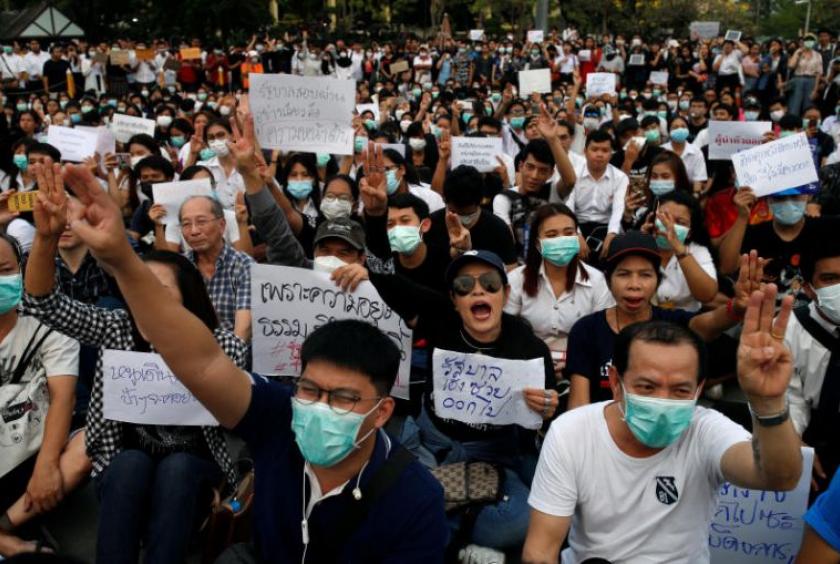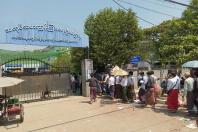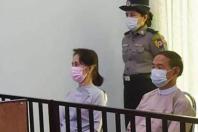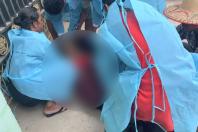
The Straits Times / ANN
BANGKOK/PATHUM THANI - Making the three-finger salute, a gesture from blockbuster The Hunger Games to signify defiance against a dictatorial regime, and singing Do You Hear The People Sing? from the musical Les Miserables, a few hundred students at a prestigious high school known for academic excellence on Thursday (Feb 27) morning joined a wave of anti-government protests across the country.
For Triam Udom Suksa School, located in the heart of Bangkok, an organised protest led by the students themselves was a rare sight.
"I have heard objections to why kids like us need to come out and protest. I want to ask them why they think kids cannot express our political opinions," 17-year-old Napat Sengrod told the crowd.
An unprecedented wave of flash mobs at various universities and even high schools was triggered this week over last Friday's court verdict to disband Future Forward, the second biggest Opposition party, over party leader Thanathorn Juangroongruangkit's loans worth 191 million baht (S$8.4 million) to his party.
Starting with Thammasat University in Pathum Thani province, which organised a candlelight vigil on Friday night, it spread to more than two dozen other universities in several parts of Thailand and at least two high schools in Bangkok.
Representing a new force in Thai politics, Future Forward quickly gained popularity among the younger generation after it was formed in 2018, scooping up 81 seats in the March general election last year for its anti-junta stance and promotion of transparency and progressive issues.
Prime Minister Prayut Chan-o-cha warned students on Thursday against protesting, saying they "may not have a future" if they are put in prison. "I'm not angry at these kids at all. I'm just concerned," he said.
In response, the Student Union of Thailand said in a statement that "instead of threatening students, Mr Prayut should just focus on the censure debate".
Mr Prayut is one of six politicians in the ruling coalition being grilled in Parliament in the country's first no-confidence motion in seven years. The vote will be held on Friday at 9.30am local time (10.30am Singapore time).
The flash mobs - protests of small to medium sizes announced only a day ahead that quickly disperse - are a new trend that stand in sharp contrast to the massive sit-in demonstrations that dragged on for weeks by both supporters and opponents of former prime minister Thaksin and Yingluck Shinawatra from the mid 2000s to 2014.
Using social media to their advantage, each campus and school organised their own protests with separate hashtags like Thammasat University's "Those dissolving Future Forward are my uni alumni," and Satriwithaya School's "Senate that sides with democracy," referring to the 250 senators handpicked by the military regime in power from the 2014 coup until the first half of last year. Mr Prayut was the junta leader who led the 2014 coup.
During Triam Udom's half-hour flash mob, students, who were in school uniforms and concealed their faces with surgical and anti-pollution masks, wrote their views on canvas and held up signs saying "Triam Udom does not kowtow to dictatorship" and "The grades we just received are less important than democracy" amid a heavy police presence.
In one of the biggest gatherings, over 2,000 students and non-students gathered at Thammasat University Rangsit's campus in Pathum Thani province late on Wednesday to express their frustration at the verdict they deemed unfair and a double standard when politicians on the government side have not faced such a crushing fate.
But the protests at Thammasat and elsewhere are no longer confined to only the dissolution of Future Forward, which protesters have called "the last straw". They are evolving into a movement calling for change.
"We're here to fight for our future. If we don't make them stop taking advantage of us then they will do it forever," said 19-year-old Sarawut Chang-um.
Turning on their smartphones' flashlights in unison as a gesture of protest, the crowd chanted "Dictators, get out. Long live Democracy."
"Future Forward Party was an agent for change and reform for a better Thailand. But it's more than just the party," said Dr Thitinan Pongsudhirak, a political science professor at Chulalongkorn University.
"These young Thais grew up over the last 15 years seeing their country stuck… They see no good future ahead for Thailand under the current regime, which has been in power for nearly six years. They don't want to be stuck with a disguised military regime in the 2020s."
Provided that the movement does not fizzle out, Dr Thitinan said: "This situation is fast becoming combustible to the point that Prayut's time in office may become untenable."









